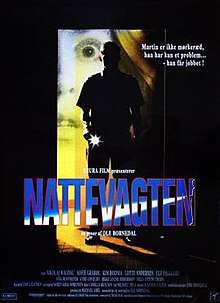Nightwatch (1994 film)
Nightwatch (Danish: Nattevagten) is a 1994 Danish thriller film directed and written by Danish director Ole Bornedal. The film involves Martin (Nikolaj Coster-Waldau) who gets a student job as night watchman at the Forensic Medicine Institute. When making his rounds he finds he must go to where the deceased people are kept. At the same time, a series of murders occur among women in Copenhagen as well as mysterious and unexplained things happening in the medical department.[1]
| Nightwatch | |
|---|---|
 Danish film poster | |
| Directed by | Ole Bornedal |
| Produced by | Michael Obel |
| Written by | Ole Bornedal |
| Starring | Nikolaj Coster-Waldau Sofie Gråbøl Kim Bodnia Lotte Andersen Ulf Pilgaard |
| Music by | Joachim Holbek |
| Cinematography | Dan Laustsen |
| Edited by | Camilla Skousen |
Production company | Thura Film |
Release date |
|
Running time | 104 minutes |
| Country | Denmark |
| Language | Danish |
Nightwatch was a success in Denmark and was shown at the Fantafestival in 1995. An American remake of the film which was also directed by Bornedal, was released in 1997. The original Nightwatch was included on a list of the top 100 Danish films as chosen by Kosmorama.
Plot
Martin (Nikolaj Coster Waldau) gets a student job as night watchman at the Forensic Medicine Institute. When making his rounds he finds he must go to where the deceased people are kept. At the same time, a series of murders occur among women in Copenhagen, and as mysterious and unexplained things start to happen in the medical department.
Production
Director Ole Bornedal began writing the script for Nightwatch after the release of his television film Masturbator (1993).[2][3] He was inspired to make the movie after a trip he made to a morgue in Copenhagen.[4] He stated in an interview, "I went to this morgue in a city of one million people, and it was both scary and beautiful. It made me think about how, outside, there is this daily life going on, and suddenly you're standing in a cellar realizing this is where it all ends. It makes you think about life and how you're living it."[4]
Bornedal also wrote much of the script at night, he states: "I was writing the story at night, in an office all by myself, sometimes until four in the moming. I didn't dare go out to my car because I would have to walk through all of these dark hallways."[4] Principal photography would occur in Denmark during 1993.
Cast
- Nikolaj Coster-Waldau as Martin Bork
- Sofie Gråbøl as Kalinka Martens
- Kim Bodnia as Jens Arnkiel
- Lotte Andersen as Lotte
- Ulf Pilgaard as Peter Wörmer
- Rikke Louise Andersson as Joyce
- Stig Hoffmeyer as Rolf
- Gyrd Løfquist as The Old Nightwatch
- Niels Anders Thorn as The Doctor
Release
The film was released on February 25, 1994.[5] Nightwatch was a success in Denmark where it sold 465,529 tickets.[6] The film was shown at the 1995 Fantafestival in Rome, Italy.[7] The film was selected to be part of the 1994 Critic's Week at the Cannes Film Festival.[8]
A DVD of Nightwatch was released by Anchor Bay on May 29, 2001. The disc contains an audio commentary by Ole Bornedal and a theatrical trailer for the film.[9]
Reception
Ole Bornedal felt that Nightwatch was not "a great work of art, but it did help legitimate the idea that even European film art can make good use of generic stories."[10] Nightwatch was included on a list of the top 100 Danish film as chosen by Kosmorama.[11] Rikke Louise Andersson won the award for Best Supporting Actress for her portrayal of Joyce in the film at the 1995 Bodil Awards.[12] Variety gave the film a fairly favorable review, referring to it as a "slickly made but fairly conventional tale".[13]
Remake
An American remake of the film was also titled Nightwatch and was released in 1997. Ole Bornedal directed this English-language remake, but director Steven Soderbergh wrote a new script based on Bornedal's original film.[14]
Notes
- Tobey, Matthew. "Nightwatch". Allrovi. Archived from the original on January 13, 2012. Retrieved January 5, 2012.
- Hjort, 2003. p. 229
- Hjort, 2003. p. 231
- http://www.cinemareview.com/production.asp?prodid=172
- "Nattevagten". The Danish Film Institute (in Danish). Retrieved January 5, 2012.
- Hjort, 2003. p. 235
- "15° Fantafestival – 1995". Fantafestival (in Italian). Retrieved January 5, 2012.
- "Cannes Critics' Week names pic selections". Variety. April 21, 1994. Retrieved January 5, 2012.
- Buchanan, Jason. "Nightwatch - DVD". Allrovi. Archived from the original on July 23, 2012. Retrieved January 25, 2012.
- Hjort, 2003. p. 234
- "Dansk Spillefilm Top 100". The Danish Film Institute (in Danish). Archived from the original on July 1, 2013. Retrieved January 5, 2012.
- "1995". Bodil Awards (in Danish). Archived from the original on March 8, 2012. Retrieved January 25, 2012.
- Nesselson, Lisa (May 29, 1994). "Nightwatch". Variety. Retrieved January 5, 2012.
- Stewart, Bhob. "Nightwatch". Allrovi. Retrieved January 25, 2012.
References
- Hjort, Mette; Ib Bondebjerg (2003). The Danish Directors: Dialogues on a Contemporary National Cinema. Intellect Books. ISBN 1-84150-841-1.